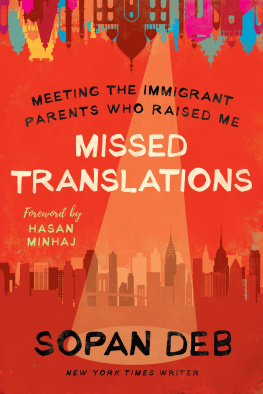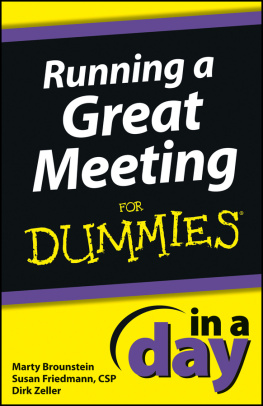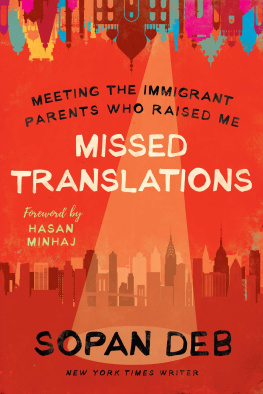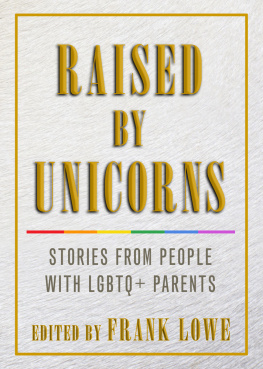Sopan Deb - Missed Translations: Meeting the Immigrant Parents Who Raised Me
Here you can read online Sopan Deb - Missed Translations: Meeting the Immigrant Parents Who Raised Me full text of the book (entire story) in english for free. Download pdf and epub, get meaning, cover and reviews about this ebook. year: 2020, publisher: HarperCollins, genre: Home and family. Description of the work, (preface) as well as reviews are available. Best literature library LitArk.com created for fans of good reading and offers a wide selection of genres:
Romance novel
Science fiction
Adventure
Detective
Science
History
Home and family
Prose
Art
Politics
Computer
Non-fiction
Religion
Business
Children
Humor
Choose a favorite category and find really read worthwhile books. Enjoy immersion in the world of imagination, feel the emotions of the characters or learn something new for yourself, make an fascinating discovery.
- Book:Missed Translations: Meeting the Immigrant Parents Who Raised Me
- Author:
- Publisher:HarperCollins
- Genre:
- Year:2020
- Rating:4 / 5
- Favourites:Add to favourites
- Your mark:
- 80
- 1
- 2
- 3
- 4
- 5
Missed Translations: Meeting the Immigrant Parents Who Raised Me: summary, description and annotation
We offer to read an annotation, description, summary or preface (depends on what the author of the book "Missed Translations: Meeting the Immigrant Parents Who Raised Me" wrote himself). If you haven't found the necessary information about the book — write in the comments, we will try to find it.
Sopan Deb: author's other books
Who wrote Missed Translations: Meeting the Immigrant Parents Who Raised Me? Find out the surname, the name of the author of the book and a list of all author's works by series.
Missed Translations: Meeting the Immigrant Parents Who Raised Me — read online for free the complete book (whole text) full work
Below is the text of the book, divided by pages. System saving the place of the last page read, allows you to conveniently read the book "Missed Translations: Meeting the Immigrant Parents Who Raised Me" online for free, without having to search again every time where you left off. Put a bookmark, and you can go to the page where you finished reading at any time.
Font size:
Interval:
Bookmark:
To Wesley, my rock and partner,
without whom none of this would have happened
Given the endless supply of S names in my family, heres a quick reference guide to keep you oriented.

When Sopan asked me to write this foreword, I was honored. The man has an impressive rsum. He has worked as a journalist for the Boston Globe, NBC News, Al Jazeera, and CBS News, where he covered Trumps presidential campaign. He then became a culture writer at the New York Times, and now hes on the NBA beat there. I want that job. Watch basketball all day, analyze it, and get paid for it? Thats the dream gig. But hes also a stand-up comedian. Thats the genius move he pulled offgetting an extremely reputable day job that his family understands and can be proud of, and then sneaking comedy into the bottom of his rsum. Brilliant.
Sopan could write about anything, but for him to choose to write about his experiences growing up brown in America to two immigrant parents is special to me. Ive always felt that the South Asian diaspora needs more of our stories being told. There are certain mythologies of growing up brown in America that we all share. I see so much of my family in Sopans storyhis fathers pride, his mothers stubbornness, his partners need to be endlessly patient and forgiving. Theres so much time spent sitting in living rooms doing nothing. So much time.
His longing to bond with his father over sports, to learn about his parents siblings, and to make his mom happy by bringing her to a Broadway show are not just immigrant sentiments, but American ones. His yearning to connect to his family is relatable on so many levels.
Sopan and I had similar upbringings. Were both kids with melanin who grew up in super white townsHowell, New Jersey, and Davis, California, respectively. We both came of age around the same time. Our parents both had arranged marriages, lived far from home and their families, and learned how to use email waaaaay after it was socially acceptable. I dont know this for sure, but I would guess we both obsessed over the same Air Jordans when we were in high school.
Nevertheless, our individual experiences are unique, nuanced, and worth sharing. But Sopan pushes his story well beyond the typical, Hey my parents wanted me to get straight As model minority narrative. He dives right into the darkest sides of South Asian culture, stuff that we only see in our living rooms, but never talk about. Depression, divorce, abuse, and betrayal are put front and center. And he does this in the gutsiest way possible: he asks his parents about it to their face.
South Asian families dont talk about their problems. Were expected to tough it out, take a nap, sweep it under the rug, and go back to work. The most therapy most of us received came from illegally downloaded episodes of The Sopranos that we watched after everyone else was asleep.
Were not equipped to handle this stuff. But Sopan goes at it head-on, like only a true journalist (and comedian) could. I genuinely hope that this book starts a conversation between family members. We need it. No more lying about our pasts. Who were dating. Why our parents are unhappy. Why we wont talk about mental health or therapy. Hes forced my hand at dealing with these issues. And if all of this is too heavy, at the very least I hope it forces some Indian uncles to tell the truth about how much money they had in their pockets when they first came to America.
S hambo, the thing is that if you do not have peace at home, you can work hard or whatever, but youve got to have someone to come back to, Atish said. You remember I used to watch my favorite television show, Cheers? And there was that song called
You want to go where everybody knows your name, yeah, I interrupted.
So this is the thing. Where you are comfortable, where you feel good: Thats the thing that you guys didnt have. Like if Im away, as soon as I get out of home, lets say fifteen minutes, I get a phone call. Where are you? Atish said, looking at Sima, his wife of more than thirty years. Sometimes I get mad. She always worries about me. But thats the thing: I know inside that Im wanted. That someone is missing me. Someone wants me home. So thats the thing: You have to have love in your life.
I grabbed the mic and locked in. It was January 2018, on the cusp of my thirtieth birthday, and I was prowling back and forth onstage at the Comic Strip Live, a comedy club on New York Citys Upper East Side. I was absolutely killing it, man. A rare feeling.
Stand-up comedy crowds can be warm. Im prepared for them to be icy. Used to it, really. But this one was on fire. Bodies were squeezed into every seat just looking for an excuse to laugh. I felt larger than life, like Mario after eating a mushroom or LeBron dunking on a fast break.
The Comic Strip is an institution. Seinfeld. Chappelle. Sandler. Murphy. Rock. Every comic who has made it had, at some point, gone through this place. The venue is deep and cavernous, with seats crammed at long tables strewn throughout the room. Behind the stage is a familiar brick wall. Somewhere between the main stage and the front entrance, out of sight of the crowd, is a green room for performers, which is more like a green broom closet. In some parts of the venue, its hard to see the performer. When youre the one telling jokes, you cant see shit.
My set was part of the Big Brown Comedy Hour, a recurring show that Dean Obeidallah and Maysoon Zayid, New York Citybased comics, started in 2009 as a way of putting a spotlight on up-and-coming comics of South Asian or Middle Eastern descent. These shows are always packed to the brim with, well, brown people who rarely get to see shows like this. When brown crowds are in, they come to laugh.
After seven years of doing comedy, getting the room to laugh because of something I constructed still gives me a high. When a punchline really landsI mean, reallyit is the kind of moment I want to freeze, store in a jar, and put on a shelf forever. Or pour into one of those Pensieves from Harry Potter.
But laughter is fleeting, and you have to keep things fresh. That night, I decided to test out some new materiala seasonally appropriate bit about the holidays:
My favorite Christmas tradition growing up was asking my mom what the meaning of Christmas was. Every year, wed be like, Hey Mom! Whats the meaning of Christmas? Shed go, Oh, its when Jesus died on the cross. Wed say, Oh. Why did Jesus die on the cross? Shed answer, Its because Jesus became a carpenter instead of a DOCTOR!
The bit played on a tired South Asian trope that Indian kids are supposed to become doctors. It didnt quite slay, but I heard the laughter ripple across the room. What I didnt hear was my own bullshit.
For one thing, I grew up Hindu. My family didnt exactly have Christmas traditions, which explains why I confused Christmas and Easter. The only traditions of any kind we had were family squabbles and seething resentment that split our family into warring factions. What I knew about healthy families at Christmas was what I saw in pop culture. Think chestnuts roasting on an open fire or Miracle on 34th Street or Tim Allens The Santa Clause. Yes, even the last one.
The best stand-up comics deliver searing honesty to the audience. Theyre supposed to expose and clarify truths about the world as they see it. They heighten hypocrisies and spotlight inequalities, and they do it all for the crowds amusement. Someone once framed it for me this way: The greats tell the audience what is funny rather than try to make them laugh.
Font size:
Interval:
Bookmark:
Similar books «Missed Translations: Meeting the Immigrant Parents Who Raised Me»
Look at similar books to Missed Translations: Meeting the Immigrant Parents Who Raised Me. We have selected literature similar in name and meaning in the hope of providing readers with more options to find new, interesting, not yet read works.
Discussion, reviews of the book Missed Translations: Meeting the Immigrant Parents Who Raised Me and just readers' own opinions. Leave your comments, write what you think about the work, its meaning or the main characters. Specify what exactly you liked and what you didn't like, and why you think so.








